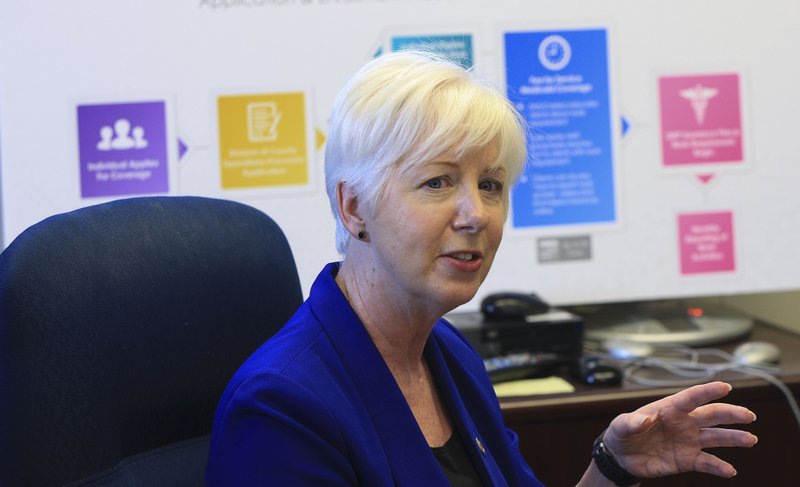Nurses and care workers at some state facilities will lose out on as much as $500 per week in state-provided pandemic bonus pay if they call in sick, according to an internal memo obtained by the Arkansas Democrat-Gazette.
Addressed to employees of Conway Human Development Center, the document describes an attendance policy that the state Department of Human Services later confirmed applies across six of its residential care sites.
Covering roughly 1,400 workers at five centers for people with disabilities, as well as a psychiatric nursing home, the rule offers a choice to caretakers of vulnerable residents: stay home sick and forfeit extra pay, or go to work.
"To qualify for an enhanced payment, you must have NO call-ins during the pay period," said the memo, which was sent by Conway Human Development Center superintendent Sarah Murphy and has been authenticated.
[CORONAVIRUS: Click here for our complete coverage » arkansasonline.com/coronavirus]
"This includes any additional shifts you may have volunteered to work."
Disability Rights Arkansas' director said the rule tied to the bonus effectively "disincentivizes" staff members from staying home when they need to, raising the risk of spreading illness to clients.
"[If] I see this potential bonus coming out this week, and I feel kind of sick, I'm going to go to work -- whether it's a cold, flu, whatever it might be. I want to get my paycheck, and I'm going to get that bonus," the director, Tom Masseau, said.
A spokeswoman for the Human Services Department said Tuesday that it was "not accurate" to suggest that the rule encourages ailing employees to work, and that similar rules are in place during holiday periods.
"A sharp rise in the number of call-ins could affect our ability to adequately and safely staff the facilities. That's why the call-in policy is in place," the spokeswoman, Amy Webb, wrote in an email.
Some sites have seen as much as a 20% increase in employees calling out of work during the public-health emergency, she added.
"It is difficult -- and often impossible -- to social distance while providing one-on-one client or resident care. That's not a job everyone is willing to do, especially during a pandemic."
Caregivers working in private businesses and nonprofits such as most nursing homes aren't affected. Those facilities didn't have to agree to the policy to receive the state-paid bonuses for their staffs, Webb said.
The facilities subject to the policy are the Human Development Centers in Arkadelphia, Booneville, Conway, Jonesboro and Warren, which largely serve adults with intellectual disabilities, and Arkansas Health Center in Benton, a 310-bed site for elderly people with special needs or cognitive dysfunction.
Long-term and residential care centers are thought to be at heightened risk during the global outbreak because of the ease with which the coronavirus spreads in confined settings and close contact between the staff and often-frail clients.
That's one reason Arkansas initiated a bonus program for its long-term-care health workers, which is being paid for through a Medicaid waiver. The initiative was formally approved by regulators last week.
The bonuses, paid in addition to salary, range from $125 to $500 per week through May 30. They go to long-term-care workers who aren't doctors, such as nurses, certified nursing assistants, and respiratory and occupational therapists.
Full-time workers at a site where someone has tested positive for covid-19, the disease caused by the coronavirus, earn the biggest bonuses.
Gov. Asa Hutchinson said last week that the program "will alleviate some of the financial stress for the caregivers, who are selflessly serving in nursing homes, assisted living facilities and in private homes at increased risk to their own health."
Announcements of the payments, however, have not detailed the attendance policy for state-employed Department of Human Services direct-care employees in the six facilities.
Hutchinson said in a statement Tuesday that he has "confidence that those dedicated health care workers would not put their patients at risk by going to work sick."
To stave off outbreaks, Webb said the residential-care sites run by the state have stopped allowing visitors, and are doing temperature checks and symptom screenings for employees.
"We take the health and safety of clients, residents and staff very seriously, and are doing everything we can to limit the spread of this virus to our facilities," she wrote.
Lori Porter, chief executive officer of the Missouri-based National Association of Health Care Assistants group, says she has often heard of hazard pay for care workers coming with strings attached related to attendance.
Certified nursing assistants make only about $13 per hour on average in the first place, she added.
"It's ridiculous," she said. "We'll pay you a little extra, but by God, you better be here."
Cash incentives related to employee attendance backfired on another employer as the virus spread, according to reports.
The Argus Leader newspaper of Sioux Falls, S.D., reported that the Smithfield Foods plant there offered employees $500 "responsibility bonus" checks if they did not miss a day of work in April.
"I feel like they're bribing us with money to come to work sick," one worker, who was not named in a report, told the newspaper. The plant has now been linked to more than 600 virus cases, and has temporarily closed.
Metro on 04/23/2020
